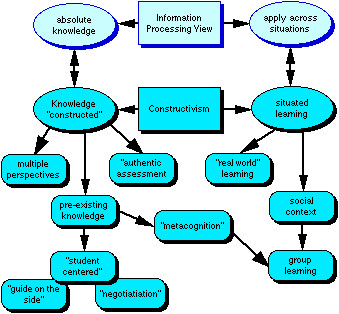Constructivist Theory
This week we will consider the most recent overriding "metaphor" in education, the constructivist perspective. We can consider this perspective on two levels, theoretical and applied. Although they are interesting, the theoretical roots of constructivism are somewhat complex and also are certainly not clear cut. However, we can make some very general statements with regard to constructivist theory and how it differs from the information processing view. Before we launch into constructivism, it's important to consider a couple of characteristics of the information processing view for contrast. First, this view has it that learning can be conceived as internal structures (e.g., long term memory) changing to reflect changes in the external world, which represents "reality". Within the traditional information processing view this real world is "knowable" and, as a consequence a student's knowledge can be ultimately judged as right or wrong. A second important characteristics of the information processing view is that there are general principles of learning, knowledge, etc that hold true across situations and across learners, and it is the job of the researcher and theorist to ascertain these general principles. (See figure below)

On the other hand, a fundamental characteristic of the prototypical constructivist view is that no knowledge is absolute, rather knowledge is constructed. For example, the constructivists point to all the times in history when something was thought be a "fact", but was later discounted. This view is in contrast with the "absolute reality" basis of the information processing view. Another fundamental characteristics of the structuralist perspective is that learning only occurs within some context. So, for example, to consider learning independent of the environment in which it occurs (e.g., school, work, or play), is unrealistic and incomplete. This, again, is inconsistent with both the behaviorist and information processing views (and much of science in general, for that matter) in that these latter theories are based on the assumption that fundamental principles can be ascertained that will apply broadly across contexts and across learners.
These distinctions may sound quite abstract and removed from "real life" classroom instruction to you. In fact, in a practical/applied sense there are some important implications and practices that have emerged from this constructivist view since it has come into favor in the last decade. The general view that knowledge is not so absolute, that it is "constructed" puts more of an emphasis on the knowledge and conceptions that students brings to the classroom. This leads to a more "learner centered approach", with the teacher as more of a "guide on the side", as opposed to a "sage on the stage". Further, in a "constructivist classroom" students are more free to participate in the planning (i.e., "negotiate") and, even, the assessment process. Another implication of the "relative" nature of knowledge contention is that it is important to present the learner with multiple perspectives on a single topic or concept.
Group learning, which we discussed in a previous virtual lecture, is often emphasized as a part of constructivist practice. First of all, due to the emphasis on student's preexisting knowledge, it is important for students to somehow make their knowledge explicit/visible, and, one of the best ways to do this is to encourage learners to voice their thoughts and ideas to peers. (Awareness of one's own self-knowledge is often referred to as "metacognition", which will be addressed in a future virtual lecture). Group learning is also consistent with the basic notion that learning occurs within a given context, in that, the context that is often emphasized by constructivists is the "social context." Another important implication of the contextualized nature of knowledge, which is a hallmark of much constructivist practice, is that learning should be tied to real life, "authentic", tasks. As much as possible, according to this view, instructors should make an effort to tie class materials to some sort of "real world application". This approach has lead educators to rethink the assessment process, and includes things like "authentic assessment" that we will discuss later, in which the emphasis is on the learner performing some "real life" task.